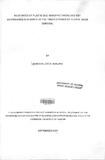| dc.description.abstract | The plastic industry is one of the fastest growing in Africa. In Kenya, the industry is
growing at a rate of 8 - 10 %. Most of the plastic products produced have short
service life, among them is the plastic bags which are very popular because of their
versatility, durability and are ease of storage. It is estimated that over 8 million plastic
bags are handed out at the supermarkets every year.Most of the plastic bags
produced in Kenya are less than 15 microns. This means that they cannot be
recycled:
In all urban centers in Kenya, plastic bags of all sizes are found dotting the
landscape. Besides this visual pollution, plastic bag waste contributes to blockage of
drains, death of marine life and animals through choking. Plastic bags are non
biodegradable and take 20 - 1000 years to break down. Wangari Maathai, the Assistant Minister for Environment in Kenya and 2004 Nobel Peace Prize winner,linked plastic bag litter with Malaria. The bags when discarded, can fill with rain water
offering ideal and new breeding grounds for malaria carrying mosquitoes. Top politicians, members of parliament, environment lobbyists and ordinary people
have complained about the problem from time to time. Various solutions have also
been voiced. A motion was passed in parliament on 8th December 2004 calling for
use of sisal bags as opposed to polythene bags (Daily Nation, 9th December 2004).
During the debate some members of parliament recommended a ban of plastic bags.
Professor Wangari Maathai launched an antiplastic campaign on becoming a Nobel
Peace Prize Laureate. No study has been conducted to establish what solutions
have been implemented towards the problem hence the need to conduct this study.
The research objective was to determine the responses of plastic bag manufacturers
and key supermarkets to the threat posed by plastic bag disposal. The supermarkets
selected were Nakumatt and Uchumi. This is because they are the largest
supermarkets in Kenya, as a result they consume most of the plastic bags. Kenya
Association of Manufacturers is an organization that deals with advocacy and policy
issues for its members. In this study Kenya Association of Manufacturers was picked
as the representative body of the plastic bag manufacturers. In Kenya there are
approximately 100 - 150 plastic bag manufacturers, out of these 55 of them are
members of the Kenya Association of Manufacturers. The role of KAM has become
of increased importance in the recent past to the plastic bag manufacturers, because
the plastic issue has started drawing attention from the public, the Government and
the environmentalists.
The study was conducted by administering questionnaires to senior management of
the three organizations. These questionnaires sought to find out the general
information on each organization, how they rate the different economic factors and
ecological changes and finally how they have responded to the plastic bag menace.
From the findings, it was evident that all the organizations have responded both
operationally and strategically. Some of the operational strategies cited were
research and development, training of staff, marketing and procurement. Strategic
responses involved culture shift, policy changes, product development, social
responsibility and changes in systems and processes.
Further the study shows that all the organizations have adopted different responses.
It also shows that the organizations are more reactive to the problem than proactive.
The launch of the biodegradable plastic bags is however a key step towards the right
direction. In addition to individual responses, the organizations should look at having
a united front towards this problem. This would involve formulating and implementing
strategic and operational initiatives that would help curb the problem proactively as opposed to dealing with the aftermath effects of disposal | en |

